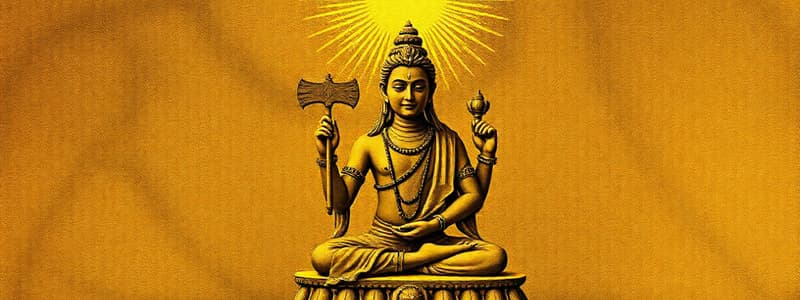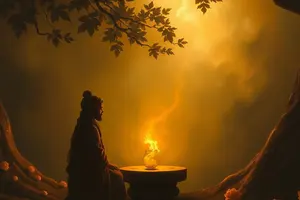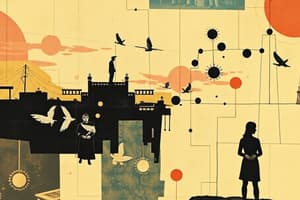Podcast
Questions and Answers
What does 'moksha' represent in Hindu philosophy?
What does 'moksha' represent in Hindu philosophy?
- The individual soul or self
- Liberation from the cycle of samsara (correct)
- The ultimate reality of the universe
- The cycle of birth and rebirth
Which of the following is considered the ultimate, all-encompassing reality in Hinduism?
Which of the following is considered the ultimate, all-encompassing reality in Hinduism?
- Brahman (correct)
- Atman
- Karma
- Samsara
What characterizes 'Saguna Brahman' in Hinduism?
What characterizes 'Saguna Brahman' in Hinduism?
- The formless essence beyond understanding
- Brahman worshipped in personal, attributed forms (correct)
- The eternal, unchanging reality
- The cycle of rebirth and karma
What is the core theme of interconnectedness in Eastern philosophy primarily opposed to?
What is the core theme of interconnectedness in Eastern philosophy primarily opposed to?
How are the concepts of 'samsara' and 'karma' interconnected in Hindu philosophy?
How are the concepts of 'samsara' and 'karma' interconnected in Hindu philosophy?
Which of the following accurately describes the Vedanta school of thought?
Which of the following accurately describes the Vedanta school of thought?
What does the term 'atman' refer to in Hinduism?
What does the term 'atman' refer to in Hinduism?
Which aspect of Hindu philosophy emphasizes a relationship between individual actions and their consequences?
Which aspect of Hindu philosophy emphasizes a relationship between individual actions and their consequences?
What distinguishes Indian philosophy from many Western philosophical perspectives?
What distinguishes Indian philosophy from many Western philosophical perspectives?
Which of the following best describes the purpose of dharma in Hinduism?
Which of the following best describes the purpose of dharma in Hinduism?
Which god is primarily associated with preservation in Hinduism?
Which god is primarily associated with preservation in Hinduism?
What is the significance of karma in the context of a person's actions?
What is the significance of karma in the context of a person's actions?
Which of the following paths can lead to moksha in Hinduism?
Which of the following paths can lead to moksha in Hinduism?
Which text is classified as 'Shruti' in Hindu scriptures?
Which text is classified as 'Shruti' in Hindu scriptures?
What does 'Artha' represent as one of the four purusharthas?
What does 'Artha' represent as one of the four purusharthas?
Which of the following is NOT one of the major deities of the Hindu Trinity (Trimurti)?
Which of the following is NOT one of the major deities of the Hindu Trinity (Trimurti)?
Which aspect of Hinduism emphasizes the relationship between personal actions and the consequences they produce?
Which aspect of Hinduism emphasizes the relationship between personal actions and the consequences they produce?
Which of the following accurately describes 'Kama' in the context of the four goals of life?
Which of the following accurately describes 'Kama' in the context of the four goals of life?
What role does Shiva play in the Hindu belief system?
What role does Shiva play in the Hindu belief system?
Flashcards are hidden until you start studying
Study Notes
Overview of Eastern Philosophy
- Eastern philosophy originates from Asia, heavily influenced by cultures in India, China, Japan, and Southeast Asia.
- It presents a diverse approach to topics such as existence, ethics, and self, contrasting significantly with Western philosophies.
Core Themes in Eastern Philosophy
- Focus on interconnectedness rather than individualism traditionally found in Western thought.
- Emphasizes the integration of individuals within larger wholes: society, nature, and the cosmos.
Indian Philosophy
- Comprises six orthodox schools (acknowledging Vedic authority) and several heterodox schools (not adhering to Vedas).
Hinduism
- A major aspect of Indian philosophy with multiple streams, including Vedanta, Yoga, and Samkhya.
- Central to Hindu thought is the relationship between the individual self (atman) and the universal reality (Brahman).
- Realizing the unity of atman and Brahman is key to achieving liberation (moksha) from the cycle of reincarnation.
Core Concepts in Hinduism
Brahman
- Represents the ultimate, eternal reality; formless, limitless, and the source of all existence.
- Saguna Brahman: Brahman with attributes, perceived in personal forms (e.g., deities like Vishnu, Shiva).
- Nirguna Brahman: Brahman without attributes, an abstract essence beyond human understanding.
Atman
- Refers to the eternal and indestructible individual soul; fundamentally, atman and Brahman are identical.
- The spiritual aim of Hinduism is realizing the unity between atman and Brahman for liberation (moksha).
- Achieving moksha releases the soul from the limitations of physical and mental existence.
Samsara and Karma
- Samsara: The continuous cycle of birth, death, and rebirth influenced by one's actions.
- Karma: The law of cause and effect governing the qualities of future lives based on previous actions.
- Reincarnation persists until the soul attains moksha, ending the cycle of samsara.
Key Concepts in Hinduism
- Karma: Every action generates consequences affecting future lives; good deeds lead to beneficial outcomes while bad actions result in suffering.
- Moksha: The ultimate aim, symbolizing liberation from samsara, characterized by eternal bliss and unity with Brahman. Achieved through knowledge (jnana), devotion (bhakti), or selfless action (karma yoga).
The Four Goals of Life (Purusharthas)
- Dharma: Represents righteousness and moral duty, emphasizing ethical living and fulfilling societal roles.
- Artha: Focuses on material prosperity and success, asserting that wealth must be pursued ethically alongside dharma.
- Kama: Centers on the pursuit of pleasure and emotional fulfillment, including enjoyment of arts and relationships, while remaining within dharma.
- Moksha: Spiritual liberation from the cycle of rebirth, signifying the highest aspiration in Hindu life.
The Hindu Trinity (Trimurti)
- Brahma: The creator god, responsible for the universe's inception, though less widely worshiped compared to Vishnu and Shiva.
- Vishnu: The preserver and maintainer of cosmic order, known for his avatars such as Rama and Krishna, who reincarnate to restore balance.
- Shiva: The destroyer and transformer, representing the cycle of destruction and creation, often viewed as a supreme deity by many devotees.
Scriptures of Hinduism
- Shruti: Divine revelations comprising the Vedas (the oldest sacred texts) and Upanishads (philosophical inquiries into reality and the self).
- Smriti: Human-composed texts, including epics like the Mahabharata (home to the Bhagavad Gita) and Ramayana, focusing on moral principles and cosmic battles between good and evil.
Major Deities and Devotional Practices
- Vishnu: Central to worship as a benevolent deity appearing in various incarnations; followers are known as Vaishnavas, dedicated to preserving dharma and humanity's well-being.
Studying That Suits You
Use AI to generate personalized quizzes and flashcards to suit your learning preferences.




